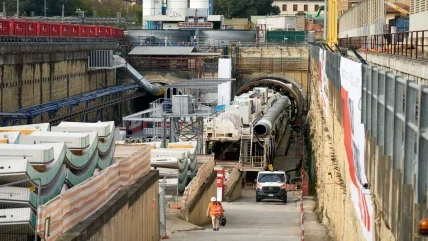
Italian railway infrastructure manager Rete Ferroviaria Italiana (RFI) said that the Marika tunnel boring machine (TBM) is ready to excavate the second tunnel for Florence’s high-speed railway bypass the Florence AV Passante.
The Marika TBM was launched in an event at the Campo di Marte construction site.
The Florence AV Passante project, which runs from Campo di Marte to Rifredi, includes the construction of the new Belfiore high-speed station and two single-track tunnels approximately 20m underground.
This is expected to create an 8.35km route for high-speed trains.
The Marika TBM, which weighs 1,500 tonnes, measures 112m in length and has a 9.4m excavation diameter, was named through a public online contest.
Equipped with more than 4,500kW of power, the Marika TBM will work in tandem with another TBM, Iris, which was activated last year and has already excavated approximately 1.8km along the Campo di Marte-Belfiore route.
Once the Iris TBM reaches Fortezza da Basso, the Marika TBM will begin work on the second tunnel, with excavation set to start by this month. The two machines will operate in alternate schedules to prevent concurrent tunnelling.
The new high-speed bypass is expected to enhance Florence’s railway system by diverting high-speed train traffic from the surface lines, thus enabling better frequency and reliability of regional services.
According to RFI, the improvements are anticipated to benefit local residents, businesses, and the tourism sector, as well as support increased use of surface railways.
The reconfiguration will also ensure that high-speed and regional trains run independently, boosting capacity for local journeys.
The Florence AV Passante is part of the FS Group’s Cantieri Parlanti project. It is an initiative developed in collaboration with the Ministry of Infrastructure and Transport (MIT) to provide the public with transparent updates on strategic infrastructure developments.
Rete Ferroviaria Italiana is overseeing the project, with Italferr managing its execution. The Florentia consortium, composed of Pizzarotti and Saipem, is responsible for the construction works.







